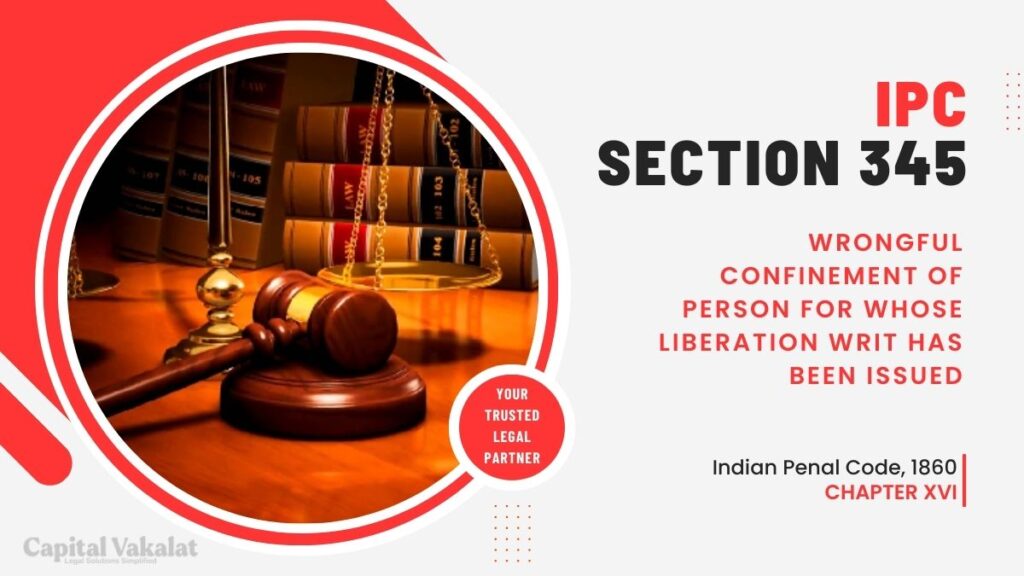In the intricate tapestry of legal statutes, Section 345 of the Indian Penal Code (IPC) stands as a significant pillar, addressing the issue of wrongful confinement of individuals for whom a writ of liberation has been issued. This provision, often invoked in legal battles, delves into the complexities surrounding the deprivation of liberty despite the issuance of a writ.

Let’s embark on a journey to unravel the nuances of Section 345 IPC, understanding its implications, historical context, and the impact it has on the broader justice system.
Understanding Wrongful Confinement
Before delving into the specifics of Section 345 IPC, it is crucial to comprehend the concept of wrongful confinement. Wrongful confinement, as defined in the legal realm, involves intentionally restraining a person against their will in a manner that violates their legal rights. This may include physical restraint, coercion, or any act that obstructs the individual’s freedom.
Writs and Their Significance
To fathom the essence of Section 345 IPC, one must grasp the significance of writs in the legal domain. Writs, derived from the English legal system, are orders issued by higher courts to compel specific actions or to protect individual rights. They play a pivotal role in safeguarding personal liberties, and any violation of these writs, leading to wrongful confinement, triggers the application of Section 345 IPC.
Section 345 IPC Explained
Section 345 of the IPC is a crucial provision that addresses the wrongful confinement of individuals despite the issuance of a writ for their liberation. The section meticulously outlines the legal consequences for such actions, ensuring accountability for those responsible. Understanding the intricacies of this provision is imperative for legal practitioners, scholars, and anyone navigating the complexities of the Indian legal system.
Historical Context
To appreciate the significance of Section 345 IPC, it is essential to delve into its historical roots. The provision has evolved over time, shaped by societal changes, legal precedents, and a dynamic understanding of justice. Exploring its historical context provides valuable insights into the intent and purpose behind the formulation of this section.
Landmark Cases
Examining landmark cases related to wrongful confinement under Section 345 IPC offers a practical understanding of how the provision is applied in real-world scenarios. These cases serve as legal precedents, shaping the interpretation and application of the law. Notable instances provide context and guidance for legal professionals navigating similar situations.
Challenges and Criticisms
No legal provision is without its challenges and criticisms. Section 345 IPC is no exception. This section has faced scrutiny for various reasons, ranging from ambiguous language to potential loopholes that could be exploited. Addressing these challenges and criticisms is essential for fostering a robust and effective legal framework.
Reforms and Amendments
In the ever-evolving landscape of law, reforms and amendments are inevitable. Analyzing the existing challenges of Section 345 IPC prompts a discussion on potential reforms. Legal scholars and policymakers continually assess the need for amendments to ensure that the law remains relevant and serves its intended purpose.
Impact on Justice System
The impact of Section 345 IPC reverberates through the entire justice system. Its application influences legal proceedings, shapes judgments, and contributes to the broader framework of justice. Understanding how this provision interplays with the justice system provides insights into the intricacies of maintaining a delicate balance between individual rights and societal order.
Conclusion
In conclusion, Section 345 IPC plays a crucial role in addressing the wrongful confinement of individuals despite the issuance of a writ for their liberation. As we navigate the complexities of this legal provision, it is evident that its application goes beyond the confines of the courtroom, influencing the broader landscape of justice. The historical context, landmark cases, challenges, and potential reforms underscore the dynamic nature of Section 345 IPC in the Indian legal system.
Frequently Asked Questions
Are there any recent amendments proposed for Section 345 IPC?
As of my knowledge cutoff in January 2022, there were no recent amendments proposed for Section 345 IPC. It’s advisable to check the latest legal updates for the most current information.
How does the historical context of Section 345 IPC influence its interpretation?
The historical context provides insights into the intent and purpose behind the provision, shaping its interpretation in contemporary legal settings.
What are the key challenges faced by Section 345 IPC in its application?
Challenges include ambiguous language, potential loopholes, and the need for clarity in certain aspects of the provision.
How does the wrongful confinement under Section 345 IPC impact the victims?
Wrongful confinement can have severe psychological and physical effects on victims, emphasizing the importance of addressing such cases promptly and effectively.